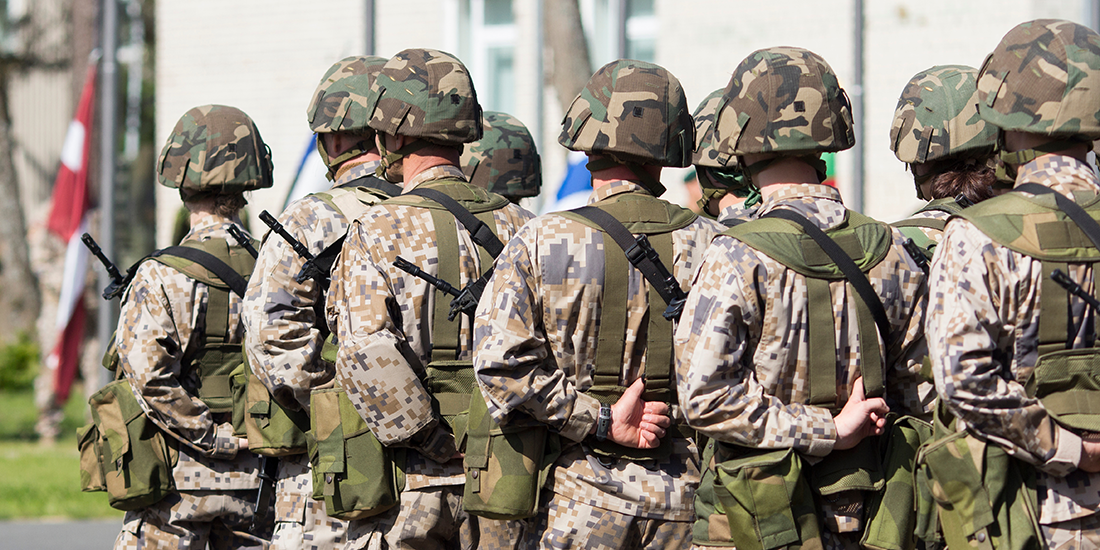Most recently published

The Protection of Critical Infrastructure: Six Questions, a Changing Threat, And an Unknown Number of Algorithms
Bilal M. Ayyub
November 16, 2005
The University of Maryland’s Center for Technology and Systems Management undertakes a major CI/KR project that will be of vital interest to other states throughout the nation, and to first responders everywhere.

Critical-Infrastructure Update: The Essential Components of Domestic Preparedness
James D. Hessman
November 16, 2005
A timely update on the steps already taken to protect the nation’s critical infrastructure, and additional actions in the planning stage. Summary: Some gains, but too many hesitations, and still a long way to go.

Publisher’s Message
Martin D. Masiuk
November 16, 2005
Critical Infrastructure: The long and difficult road ahead.

Rear Admiral Joseph L. Nimmich, USCG, Director, Global Maritime Domain Awareness (MDA) Strategy
Joseph L. Nimmich
November 16, 2005
His views on the challenges facing Navy/USCG forces deployed on what many believe is “the forgotten front” of the War on Terrorism–the nation’s coastal and offshore waters.

Army National Guard Assets and Homeland Security
Brent Bankus
November 2, 2005
The militia tradition continues in the Brave New World of the 21st century, with the Army and Air National Guard playing the lead roles–but all of the nation’s armed services are assuming new missions and responsibilities in the field of homeland defense

R. James Woolsey, Vice President, Global Resilience, Booz Allen Hamilton
R. James Woolsey and John F. Morton
November 2, 2005
A world-class statesman and patriot provides new insights on the most significant organizational and policy changes likely to be implemented to improve U.S. intelligence and information-sharing capabilities both in the near future and in the long term.

The Art and Science of Biological Detection
Rob Schnepp
October 19, 2005
The negatives and positives that come into play when a public health agency seeks to find out if “a suspicious white powder” or other substance poses a credible health threat.

Dr. James Jay Carafano, Homeland Security, The Heritage Foundation
John F. Morton
October 19, 2005
DomPrep’s John Morton met with Dr. James Jay Carafano, Senior Fellow for National Security and Homeland Security, The Kathryn and Shelby Cullom Davis Institute for International Studies, The Heritage Foundation. Dr. Carafano discusses in-depth his take on the key lesson learned from the Hurricane Katrina response: the need for a 0-to-96-hour

Pandemic Influenza and the Need for an Armageddon Plan
Joseph Cahill
October 19, 2005
The numerous complex factors involved in the step-by-step preparations to fight a violent, virulent, and invisible enemy.

Pandemic Influenza: A Catastrophe in Waiting?
Jerry Mothershead
October 19, 2005
Special Report on the threat to human life from a global avian influenza pandemic, and a long list of policies and programs that might be implemented to reduce the death toll.

On the Waterfront: Improvements in Visual Surveillance Systems
Laurie Thomas
October 5, 2005
The security officer on the beat and the trusty watch clock may both be out of work, thanks to the development of new “”intelligent video”” systems that are never bored, never mesmerized, cost less, and are more reliable.

Roger Cressey, President, Good Harbor Consulting
John F. Morton
October 5, 2005
The former White House advisor discusses the hurricane recovery and response operations, the implications for a DHS reorganization–and for the possible use of the military to cope with future disasters–and the role of the private sector.

G. Thomas Steele, Chief Information Officer, Department of Safety and Homeland Security, State of Delaware
John F. Morton
November 30, 2005
His views on, among other topics, how the Delaware Information Analysis Center serves as a valuable link to the state’s entire homeland-security community, and also interfaces with the states of Maryland, Pennsylvania, New Jersey, and Virginia.

The Protection of Critical Infrastructure: Six Questions, a Changing Threat, And an Unknown Number of Algorithms
Bilal M. Ayyub
November 16, 2005
The University of Maryland’s Center for Technology and Systems Management undertakes a major CI/KR project that will be of vital interest to other states throughout the nation, and to first responders everywhere.

Critical-Infrastructure Update: The Essential Components of Domestic Preparedness
James D. Hessman
November 16, 2005
A timely update on the steps already taken to protect the nation’s critical infrastructure, and additional actions in the planning stage. Summary: Some gains, but too many hesitations, and still a long way to go.

Publisher’s Message
Martin D. Masiuk
November 16, 2005
Critical Infrastructure: The long and difficult road ahead.

Rear Admiral Joseph L. Nimmich, USCG, Director, Global Maritime Domain Awareness (MDA) Strategy
Joseph L. Nimmich
November 16, 2005
His views on the challenges facing Navy/USCG forces deployed on what many believe is “the forgotten front” of the War on Terrorism–the nation’s coastal and offshore waters.

Army National Guard Assets and Homeland Security
Brent Bankus
November 2, 2005
The militia tradition continues in the Brave New World of the 21st century, with the Army and Air National Guard playing the lead roles–but all of the nation’s armed services are assuming new missions and responsibilities in the field of homeland defense

R. James Woolsey, Vice President, Global Resilience, Booz Allen Hamilton
R. James Woolsey and John F. Morton
November 2, 2005
A world-class statesman and patriot provides new insights on the most significant organizational and policy changes likely to be implemented to improve U.S. intelligence and information-sharing capabilities both in the near future and in the long term.

The Art and Science of Biological Detection
Rob Schnepp
October 19, 2005
The negatives and positives that come into play when a public health agency seeks to find out if “a suspicious white powder” or other substance poses a credible health threat.

Dr. James Jay Carafano, Homeland Security, The Heritage Foundation
John F. Morton
October 19, 2005
DomPrep’s John Morton met with Dr. James Jay Carafano, Senior Fellow for National Security and Homeland Security, The Kathryn and Shelby Cullom Davis Institute for International Studies, The Heritage Foundation. Dr. Carafano discusses in-depth his take on the key lesson learned from the Hurricane Katrina response: the need for a 0-to-96-hour

Pandemic Influenza and the Need for an Armageddon Plan
Joseph Cahill
October 19, 2005
The numerous complex factors involved in the step-by-step preparations to fight a violent, virulent, and invisible enemy.

Pandemic Influenza: A Catastrophe in Waiting?
Jerry Mothershead
October 19, 2005
Special Report on the threat to human life from a global avian influenza pandemic, and a long list of policies and programs that might be implemented to reduce the death toll.

On the Waterfront: Improvements in Visual Surveillance Systems
Laurie Thomas
October 5, 2005
The security officer on the beat and the trusty watch clock may both be out of work, thanks to the development of new “”intelligent video”” systems that are never bored, never mesmerized, cost less, and are more reliable.
The Other Gulf War
Martin D. Masiuk
September 21, 2005
DomPrep’s publisher discusses the impact of Hurricane Katrina, several changes and upgrades in the IMR Goup’ domestic-preparedness publications, and the company’s roadmap to an even more productive future.
Thomas Carr, Jr. Chief, Montgomery County (MD) Fire & Rescue Service
John F. Morton
September 21, 2005
Carr’s report on his department’s assistance to the states of Louisiana and Mississippi, with special focus on the unprecedented calamities the beset the so-called “City That Care Forgot.”
Public Health at the End of the World
Joseph Cahill
September 7, 2005
The nation’s public-health professionals played a major support role during and immediately after Katrina hit land – and will continue to do so long after most other first responders have gone home.
Kurt J. Nagle, President & CEO of the American Association of Port Authorities
John F. Morton
September 7, 2005
His association’s views on what is needed to meet Coast Guard/MTSA requirements, and the case for more Port Security Grant funding.
Words and Bullets: Al Qaeda’s Textbook for Terror
Neil C. Livingstone
September 7, 2005
An alarming discovery in Manchester, England, gives Western intelligence and counterterrorism agencies a Muslim insider’s view of what it takes to fight a Holy War against the United States and its allies.
Maritime FSOs: The New Breed of Homeland-Security Professionals
Laurie Thomas
August 24, 2005
The duties of the nation’s new facility security officers are many and daunting, but also vitally important both to national security and to the U.S. economic well-being.
CBRNE Attacks at Sea: Time to Revisit the Maritime SAR International
Ashley Moore
August 24, 2005
The next terrorist attacks might be against the U.S. system of ports and waterways, where the nation is most vulnerable.
The Coast Guard’s Post 9/11 Deepwater Program: An Enduring Solution for U.S. Maritime Security
Gordon I. Peterson
August 24, 2005
USCG lives up to its Semper Paratus tradition in formulating plans for the multimission service’s “fleet of the future.”
Justin Thomas Russell, Director for Port Security, Center for Security & Operations, AnteonCorporation
John F. Morton
August 24, 2005
His views on, among other important subjects, the need to balance security policies and programs against “the unfettered flow of commerce.”
USAWC’s New Emphasis on Homeland Security
Brent Bankus
August 10, 2005
One of the world’s most-renowned naval/military educational institutions revamps its curriculum to incorporate courses and research projects related to the global war on international terrorism.
Agitated Delirium: A Primer for EMS/Law-Enforcement Personnel
Jay Kehoe
August 10, 2005
The sudden death of anyone is a personal tragedy for his/her friends and next of kin – and creates a sometimes extremely complicated issue for police, EMS, and correctional personnel to deal with.
NCRP 138: Reliable Guidance for Radiation Emergencies
Rob Schnepp
August 10, 2005
In an era when terrorist attacks involving weapons of mass destruction, including radiation weapons, represent a clear and present danger, decision makers are turning to a useful document for guidance in formulating their what-if contingency plans.
Follow Us
Get Instant Access
Subscribe today to Domestic Preparedness and get real-world insights for safer communities.


